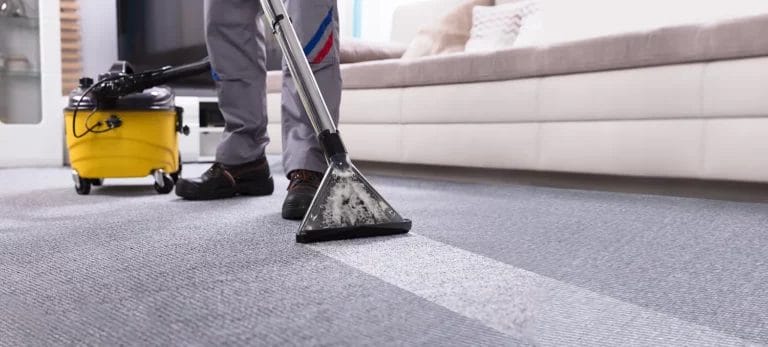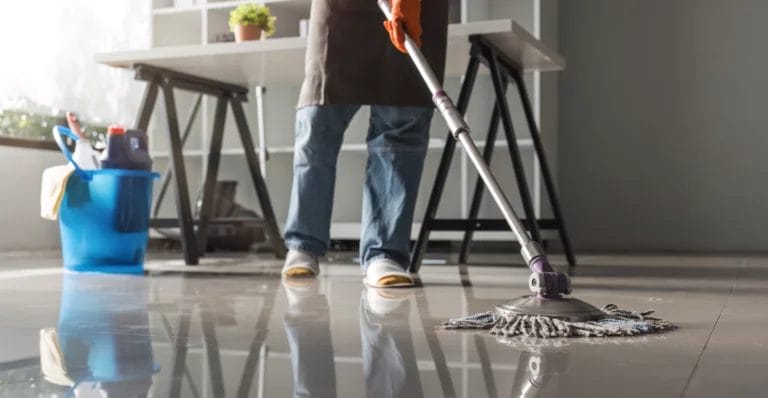Thinking about starting a cleaning business? You’re in the right place! Learn everything you need to know — from the different types of cleaning businesses you could start to creating your business plan, getting the licenses you need, and protecting your investment with the right cleaning business insurance.
Why You Should Consider Starting a Cleaning Business
Starting a cleaning business is a smart choice, with demand expected to grow at a 6.6% annually from 2023 to 2030. Here’s why it’s a great opportunity for you:
- Easy to start: Minimal investment and basic cleaning supplies needed. Perfect for quick entry into the market.
- Flexible schedule: Set your own hours and choose clients, allowing you to balance other commitments.
- Growing demand: Increased focus on cleanliness means more opportunities, especially post-pandemic.
- High profit potential: Low operating costs lead to strong profit margins, especially with recurring clients.
- Room to grow: Start small and expand into specialized services, or build a team as your business develops.
- Rewarding work: Helping clients maintain clean spaces is satisfying and visible.
- Low-cost marketing: Use word-of-mouth and social media to grow your business without a hefty budget.
Different Types of Cleaning Businesses You Could Start
Here’s a rundown of common types of services to help you explore potential specialties when starting a cleaning business. You can pick a niche or design a menu with multiple service offerings to appeal to a wider potential customer base.
House cleaning/Housekeeping
Offer regular house cleaning or deep cleaning to busy families or individuals who want a tidy home. You’ll dust, vacuum, and organize to create a welcoming space.
Carpet cleaning
Specialize in cleaning carpets and rugs using steam cleaning or hot water extraction. Help homeowners remove dirt, stains, and allergens for fresh, clean carpets.
Window cleaning
Who doesn’t love spotless windows? Provide window cleaning services to brighten up homes or offices. Use tools to reach tricky spots and leave clients with amazing views.
Commercial cleaning
Work with businesses to keep offices and commercial spaces clean. Your tasks will include restroom upkeep and floor care, helping create tidy environments for employees and customers. See how to start an office cleaning business.
Pressure washing
Tackle tough stains, mold, and grime on driveways, patios, siding, and more. This service is ideal for both residential and commercial clients looking to restore outdoor spaces to their original shine.
Janitorial
Start a janitorial business to land contracts cleaning schools, hospitals, and other public buildings. You’ll keep common areas neat and tidy, essential for a welcoming atmosphere.
Maid
Offer comprehensive cleaning solutions, including regular and deep cleaning, organization assistance, and extras like laundry and meal prep. Make your maid service a one-stop shop for home maintenance.
Green cleaning
Stand out by using eco-friendly products and sustainable practices. Green cleaning services appeal to clients who want clean spaces while being kind to the planet, and demand for green options is on the rise.
Vacation rental cleaning
Start a fast-turnover cleaning service that includes deep cleaning, restocking essentials, and ensuring the space is guest-ready, helping hosts maintain high ratings and repeat bookings.
How to Create a Cleaning Business Plan
Starting a cleaning business requires a solid plan. Here’s how to create one that sets you up for success.
Define Your Niche
Identify your specific area in the cleaning industry — residential, commercial, carpet cleaning, or eco-friendly options. Focusing on a niche helps streamline your marketing and attract clients.
Set Business Goals
Establish clear short-term and long-term goals. For example, aim to gain your first five clients in three months and expand services within five years. Use the SMART criteria: Specific, Measurable, Achievable, Relevant, and Time-bound.
Financial Projections and Budgeting
Estimate startup costs, including equipment, supplies, marketing, and insurance. Develop a pricing strategy that covers costs while staying competitive. Outline expected monthly revenue and expenses to identify funding needs.
Marketing Strategy
Create a marketing plan to attract customers with strategies for digital marketing, social media, word-of-mouth referrals, and local networking. Establish a strong brand identity with a professional logo and consistent messaging.

Licenses You Need to Start a Cleaning Business
Here’s what licenses are needed to start a cleaning business:
- General business license: A state-issued business license is generally required to run any type of business, including cleaning services.
- Sales tax permit / vendor’s license: You may need a sales tax permit or vendor’s license to collect and remit sales tax on your services. Additionally, your city or regional government might require a vendor’s license, contractor’s license, or even a specific cleaning service license, depending on the area. This could involve some paperwork, fees, and possibly showing proof of insurance and bonding.
…And here’s some things to consider:
- Research local requirements: Licensing can vary by state, county, or city, so take time to look into what’s needed in your area.
- Certifications: Professional certifications can up your appeal with residential and commercial clients alike. They can also help shore up your knowledge around safe cleaning products, ergonomics, on-the-job risks, and more.
- Familiarize yourself with OSHA guidelines: The Occupational Safety and Health Administration (OSHA) helps ensure your safety on the job. They provide information on hazards, risks, and maintain a clean and safe work environment.
- Helpful resources: Check out this blog for tips on how to start your cleaning business!
How to Register and Legally Set Up Your Cleaning Business
Before you start creating schedules and marketing your cleaning services, let’s go over the essential legal steps to get your business up and running smoothly.
Choose a Business Structure
The first big decision you’ll make is choosing the best legal structure for your cleaning business. Here are a few common options to consider:
- Sole proprietorship: This is the easiest route and works well if you’re flying solo. There’s no need for formal registration, but keep in mind that you’re personally responsible for any business debts.
- Limited liability company (LLC): Offers personal asset protection and flexibility in management and taxes. A solid choice for small businesses. Plus, LLCs can operate as S-Corps which brings some potential tax advantages.
- Corporation (C-Corp or S-Corp): Ideal for scaling up or attracting investors. Provides strong asset protection but comes with more complexity and regulations.
Register Your Business Name
Once you’ve decided on a structure, it’s time to choose a catchy name for your cleaning business. Pick something that reflects your services and is easy for clients to remember.
- If you’re going the LLC or corporation route, you’ll need to register the name with the state.
- Sole proprietors should consider registering their name as a DBA (Doing Business As) for added legal protection.
The last thing you want is to fall in love with a business name… only to find out there’s already a business with the same name in your state, or that you can’t get website domain or email and social media handles you want.
Before settling on a name, check with your state’s business registration office and search the US trademark office to ensure it’s available. Then research social media to see if your handles are taken and do a domain name search to make sure you can get the website URL you want.
Need some inspiration? Our list of house cleaning business names can help spark ideas and get the creative juices flowing.
Get an Employer Identification Number (EIN)
Next up, obtain your EIN from the IRS, a simple process that’s free. This nine-digit number is important for taxes and keeping your personal and business finances separate, especially if you plan to hire employees. You’ll also be routinely asked to provide it when working as a 1099 contractor.
Comply with the Corporate Transparency Act (CTA)
If your cleaning business is an LLC or corporation, you may need to report beneficial ownership information to FinCEN. The CTA applies to most small businesses and is aimed at increasing transparency.
- Who needs to report? If your business is registered as an LLC, corporation, or similar entity, you may be required to disclose key ownership details unless you qualify for an exemption.
- How do I file? Businesses must submit this CTA information through FinCEN’s online portal. Check their website for deadlines and required details.
Protect Yourself With Cleaning Business Insurance
Don’t forget about getting cleaning business insurance! It protects you from potential liabilities and risks in the cleaning industry. Explore insurance tailored for cleaning businesses:
- House cleaning insurance
- Carpet cleaning insurance
- Window cleaning insurance
- Pressure washing insurance
- Janitorial insurance
- Maid insurance
And here are key types of coverages you should consider — keep in mind that what you choose will impact the cost of your cleaning business insurance:
- General liability insurance
General liability is essential coverage when starting a cleaning business. It’s designed to cover third-party injury and property damage claims, including legal fees, medical expenses, and more. Many clients require proof of this insurance — especially commercial clients. - Workers compensation
Required in most states if you have employees, workers compensation covers medical expenses and lost wages for job-related injuries. It protects both your team and your business from lawsuits. - Tools and equipment insurance
Tools and equipment coverage, also known as inland marine, covers your cleaning tools in the case of theft or damage, ensuring you won’t face significant financial losses.
To learn more, check out our complete guide to cleaning business insurance and bonding.
Equipment and Supplies for a Cleaning Business
If you’re starting a cleaning business, you’ll need the right tools to get the job done.
Essential Cleaning Equipment
Essential equipment includes a good vacuum cleaner for carpets, a microfiber mop with a wringer bucket for hard floors, and a trusty broom and dustpan for quick cleanups. Other must-haves include things like:
- Microfiber cloths for versatile cleaning
- A variety of scrub brushes for tough spots
- Refillable spray bottles for your cleaning solutions
- Waste bins with garbage bags
- Protective gear like gloves and masks to keep you safe.
Specialized Tools
The specialized tools you need depend on the services you offer or the specialty you decide on when starting your cleaning company. If you’re diving into specialized cleaning, a steam cleaner is fantastic for deep cleaning without harsh chemicals, whereas a carpet cleaner is a must for tackling stains.
A window cleaning kit will help you achieve that streak-free shine, while a pressure washer is perfect for outdoor spaces. A sturdy ladder is essential for reaching high places, and consider automated devices like robotic vacuums for extra efficiency.
If you plan to grow your business, reliable vehicles for transporting your team and supplies will be a big help.

Estimated Startup Costs for a Cleaning Business
Next, we need to factor in the cost of starting a cleaning business.
Initial Investment for Equipment and Supplies
You’ll need to invest in cleaning products, tools, and safety gear. Here’s a detailed list of cleaning supplies you’ll need for starting a cleaning business.
Budgeting for Administrative Expenses
Don’t forget about administrative costs like office supplies, scheduling software, and permits. Planning for these expenses will help keep your operations running smoothly.
Costs for Marketing and Advertising
To attract clients, set aside funds for a website, social media ads, business cards, and flyers. A little investment in marketing your cleaning business goes a long way in helping you stand out in a competitive market.
How to Set Prices for Your Cleaning Services
Setting the right prices is key to your cleaning business’s success. It impacts profits, customer perceptions, and your competitive edge. Download our free Cleaning Business Pricing Guide, and check out the comparison below to see how to price your services effectively.
Hourly vs. Flat Rates
You can choose between charging by the hour or offering flat rates.
| Feature | Hourly Rates | Flat Rates | Payment Structure | Clients are charged based on the actual time spent on the job. | Clients pay a set fee for specific services, regardless of the time taken. |
|---|---|---|
| Flexibility | Highly flexible; ideal for varied tasks or clients with changing needs. | Less flexible; better for standard, defined services. |
| Client Transparency | Clients may be unsure of the total cost until the job is done. | Clients know exactly what they will pay. |
| Invoicing Process | More complex as it requires tracking hours worked | Simplifies invoicing as the cost is predetermined. |
| Potential for Earnings | Can lead to higher earnings for longer or more complicated jobs. | Predictable income for straightforward tasks. |
| Service Range | Suitable for a wide range of services, including unpredictable or irregular jobs. | Best for specific services like deep cleaning or one-time projects. |
| Market Competitiveness | Can compete with other hourly service providers, appealing to clients needing less frequent service. | Appeals to clients looking for budget-friendly options with no hidden costs. |
Factors to Consider
Consider your location, the services you offer, and your competition. Urban areas command higher rates due to the cost of living, for example.
Other services, like eco-friendly cleaning and commercial cleaning may also command different prices. Research what similar businesses charge to find a competitive yet profitable price point.
Creating Pricing Packages
Develop tiered packages, such as basic and premium options, and bundle services for discounts. Offer special deals for first-time clients to build relationships and rewards for customer word of mouth referrals.
Consider including add-on services that allow clients to customize their packages based on their specific needs and preferences. This approach can enhance customer satisfaction and encourage repeat business.
FAQs About Starting a Cleaning Business
What are the potential risks of starting a cleaning business?
Starting a cleaning business comes with risks such as market saturation, and seasonal demand fluctuations. Cleaning businesses also face liability risks like property damage, slip and fall accidents, employee injuries, and contractual disputes.
Still, some of these risks can be reduced with the right approach. For instance, market saturation often depends on location and specialization — while some areas may be crowded, niche services like “eco-friendly window cleaning” or “pet-friendly cleaning solutions” could help you stand out from the competition.
Is cleaning business insurance mandatory when starting a cleaning business?
While not always legally required, insurance is a must for any cleaning business. It protects you from expensive claims that arise from accidents, client property damage, and more — which can happen no matter how careful you are. Get general and professional liability insurance, tools and equipment coverage, workers’ compensation, and bonding to protect your career, finances, and business.
What should I do if I encounter legal or compliance issues when starting my cleaning business?
If you face legal or compliance issues, consult a legal expert or business mentor for quick resolution. To avoid legal and compliance issues: follow local rules and regulations, obtain necessary licenses and permits, secure insurance, and adhere to health and safety guidelines.
Clean Start? Insure Smart with Insurance Canopy!
Starting a cleaning business is an exciting adventure, and knowing the risks and responsibilities will help you thrive. Ready to take the plunge? Insurance Canopy offers flexible, affordable options to keep you protected while you focus on what you do best – making spaces shine. Take the first step and buy your policy today!





